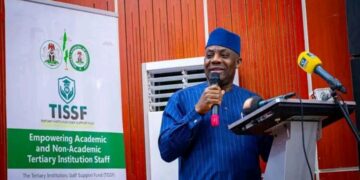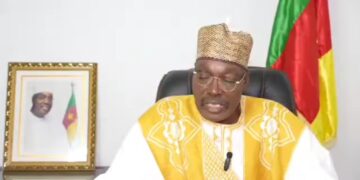![]()
Renowned oil and gas professionals have raised concerns over the sustainability of the Nigerian National Petroleum Company Limited (NNPCL), warning that its current business model is deeply flawed and unsustainable.
They have urged President Bola Tinubu to grant the new Group Chief Executive Officer (GCEO), Mr. Bayo Ojulari, full autonomy to reform the ailing institution.
The experts — Prof. Wunmi Iledare, Dr. Timothy Okon, and Engr. Emeka Ene — spoke during the Boiling Point Arena, a widely followed public discourse hosted by media strategist, Dr. Ayo Arowojolu.
The session, transmitted via Zoom and aired on six radio stations across Lagos, Ogun, and Delta States, focused on the theme: “Cleaning the Augean Stable: Can NNPCL’s New Team Fix Nigeria’s Oil and Gas Sector?”
Chairing the session was the Olowu of Owu Kingdom, Oba Prof. Saka Matemilola, a former President of the Society of Petroleum Engineers, Nigeria Council.
While commending President Tinubu for selecting a competent management team led by Ojulari, the experts unanimously called for political interference to be kept at bay.
“Nigerians must commend President Bola Tinubu for getting it right by appointing a Board and Management Team that understands the intricacies of the oil and gas industry,” said Prof. Iledare, an Emeritus Professor of Petroleum Economics at the Centre for Energy Studies, Louisiana, USA.
“However, Tinubu must allow NNPCL to function apolitically. Mr. Bayo Ojulari needs a free hand to cleanse the system and reposition the company for profitability. The Petroleum Industry Act (PIA) makes it clear that NNPCL has a commercial, not political, mandate.”
Iledare dismissed the idea of oil being a curse for Nigeria, saying, “It’s not the discovery of oil that is the problem, but how it has been managed over the years.”
Dr. Timothy Okon, former Acting Group Executive Director of Exploration and Production at NNPC, emphasized the dangers of state monopolies and flawed pricing systems.
“The previous model was set up to serve social goals rather than economic ones, leading to inefficiencies and corruption,” he said.
“Under the PIA, we must now move to a market-based mechanism. The old monopoly model made NNPCL the sole supplier and distributor, and that created room for abuse and policy manipulations.”
Dr. Okon linked Nigeria’s oil mismanagement to a broader “dependency theory,” inherited from colonial economic structures.
“We export raw crude and import refined products. That model is outdated. Without local refining capacity, we remain trapped,” he said.
Speaking in the same vein, Engr. Emeka Ene, CEO of Oida Energy Group and Chairman, Board of Trustees of the Society of Petroleum Engineers, described the problem as deeply systemic.
“NNPCL didn’t fail due to lack of expertise or corruption alone, but because it was built on a business model that was inherently flawed and unsustainable,” Ene stated.
“When your operations disregard market realities and you’re forced to sell at non-commercial rates, the business grinds to a halt.”
He explained how refineries were forced to operate against market logic:
“They received crude allocations, produced, and sold at prices dictated by policy — not the market. That’s unsustainable,” Ene argued.
“Despite the dedication of refinery staff who worked miracles with little or no spares, the model ensured eventual collapse. The funding mechanism, which routed revenue to the Federation Account before industry reinvestment, created a dangerous disconnect.”
All three experts agreed that Ojulari and his team at NNPCL have the capacity to restore the corporation’s integrity — but only if given room to act.
“This same NNPCL has delivered results in the past. It can again — if properly empowered,” Ene concluded.

























